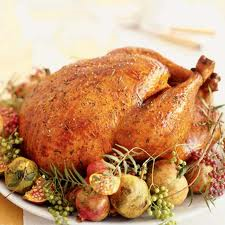10 Tips for Cooking the Perfect Thanksgiving Turkey
 Armed with Food Network’s top 10 turkey tips, you’ll come out looking like a pro on Thanksgiving Day. Whether you’re hosting your first Thanksgiving dinner or your fiftieth, these indispensable tips will help you turn out a terrific turkey.
Armed with Food Network’s top 10 turkey tips, you’ll come out looking like a pro on Thanksgiving Day. Whether you’re hosting your first Thanksgiving dinner or your fiftieth, these indispensable tips will help you turn out a terrific turkey.
1. Choose the right type of turkey for you.
Heritage? Organic? Fresh? Frozen? There are lots of choices out there. A heritage turkey is right for you if you want to try an old-fashioned breed of turkey, often leggier and leaner and more flavorful, and don’t mind paying a little extra for it. If organics are important, you may already have your eye on a turkey raised according to organic standards, and fed organic feed. If you’d prefer a traditional fresh or frozen bird, pick the healthiest-looking one in the weight range you need, and make sure it looks well fed for its size. And, remember, fresh may not necessarily be better than frozen; frozen turkeys are snap-frozen just after butchering.
2. Figure on 1 to 1 1/2 pounds of turkey per person.
To buy the right size turkey for your party, simply tally up the turkey-eating guests. Add a few pounds on for bones and you’ve got your turkey weight. For example, 8 people will require a 12 to 14-pound turkey.
3. Cook the turkey on a rack of vegetables.
Create a natural roasting rack for your turkey by layering carrots, onions and celery on the bottom of the roasting pan. Lifting the turkey off the base of the pan helps to increase hot air circulation around the whole bird so that it will get crispy all over. And the vegetables add great flavor to the gravy.
4. Brining keeps it moist.
Brining is an easy, sure-fire way to a moist and flavorful bird. A typical brining solution contains water, salt, sugar and a variety of spices and aromatics. Just be sure to follow a trusted recipe so you get the right proportion of each.
5. Keep the stuffing on the side.
Chances are the Thanksgivings of your childhood featured a stuffing cooked right in the cavity of the turkey. Go ahead and use your family recipe, but we suggest you cook the stuffing in a separate pan. Cooking the stuffing in the turkey can provide fertile ground for the growth of harmful bacteria. In addition, a stuffed turkey will take longer to cook, which could result in drier white meat. Instead, loosely fill the turkey with aromatics such as onions and herbs, and cook the stuffing separately.
6. To tie or not to tie.
To help ensure that poultry cooks evenly, many professional cooks like to truss their birds, which is just a fancy term for tying them up. While it’s not a necessary step in cooking a terrific turkey, it can be fun to show off your culinary skills at home. Simply tuck the wings of the turkey under the body and tie the legs together with kitchen string to create a tight package.
7. Rub the turkey with butter or oil.
Before putting it in the oven, make sure the skin of the turkey is as dry as possible, and then rub it all over with butter or oil. For even moister meat, place pats of butter under the skin.
8. Skip the basting.
Basting means more oven door opening, resulting in temperature fluctuations that can dry out your bird. Instead, keep your turkey moist by brining it or by rubbing it all over with butter or oil.
9. Invest in a good meat thermometer.
Check for doneness by inserting an instant-read thermometer in the thickest part of the turkey around the thigh, avoiding the bone. At 165 degrees F, it’s done. The turkey will continue to cook as it rests, so the temperature should rise another 10 degrees or so out of the oven.
10. Give it a rest.
To lock in juices, tent your turkey with foil and let it rest for at least 15 to 20 minutes before carving. Be sure you don’t cover the turkey too tightly as you don’t want the bird to steam under the foil.